You hate milk, but your child keeps insisting that you should drink it with her, because she adores it. Until your slight irritation. Then she cries, but she can’t explain why… And you lose your patience. When do children begin to know how to talk about themselves, and understand that others can have different ideas and perceptions? Knowing the stages of your child’s social development, and in particular the theory of mind, can help you to improve your relationship with your children. Let’s see how!

Photo by: Billy Huynh
Table of Contents
Social development : from me to you
I was waiting anxiously for the moment when my daughter would have been able to express her imagination, her certainties; and explain me the reason of her despair without having to enumerate infinite inconclusive hypotheses. (Because usually the answer was the only obvious thing I hadn’t thought of).
You know, those times you’re serenely playing together, with so many smiles. You get distracted 30 seconds for any reason, until desperate screams don’t make you turn abruptly: what could possibly have happened? Honey, what is it? But in response, you only get louder cries.
You try to hug your creature, but she rejects you.. Nothing, you have to try to understand. Did you get hurt? You lost the game? Is it because I went to the kitchen for a moment to get a drink leaving you alone? Men probably feel that way when women respond “Nothing” to the question “What is it?”.
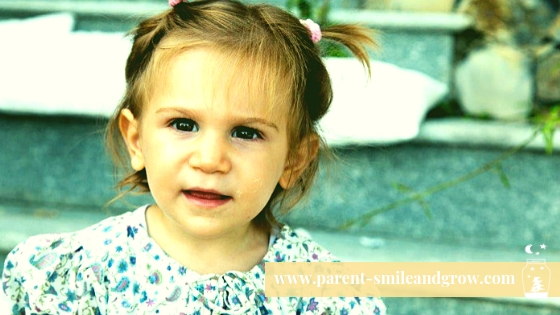
But is it so obvious that the use of words coincides with the ability to talk about oneself? To understand and verbalize needs and desires, and inferences on the emotions of others? Are the two learnings figuratively like the bearing poles of a ladder, independent but interconnected, or do they need further support?
In other words: how do I explain to my son that if he doesn’t tell me what’s wrong, I can’t help him and he will continue to cry unnecessarily?
And when will he understand that in the morning I need to leave the house on time and for me it is not important if he sits on the right or on left in the trailer of our bike, as long as we hurry?
Put yourself in the shoes of a 3-year-old child..
Theory of the mind and landmarks
The last day before Christmas break, I went to pick up my son to kindergarten. When we come back in January, he will still have a month before we move away. He knows this, the way a 3-year-old child can know.. Yes, how? What does he think?
His favorite teacher had already gone home. She had asked all of us parents to take away all of our children’s stuff during the holidays closing, because they where having a big session of cleaning inside the school. I came then with a big bag, and I asked the present educators. They brought me my son’s sleeping box.
Each child has a box where to store blankets, plush, pillows, dolls.. So everything you need to do the afternoon nap at school.
I explained to my son what I was doing. No Mommy! The Sleeping box stays here! I tried to reassure him, telling him that we will bring everything back to school after the holidays. Nothing to do.
The worst crisis of all my mom’s life began.
Emotions in crisis
Screaming, yelling, desperate crying. I tried to dress him up, but it made things worse. So I put everything in my bag anyway, and then my son started to hit me.
At that point, I took him out of the classroom, showing him the cabinets and furniture of the other classes all scattered around in the main atrium.
As soon as I let him go, he ran back inside the class looking for his sleeping box, which in the meantime the teachers had taken away. My Sleeping box! My Sleeping box! He screamed among tears.
I tried to pick him up and hold him in my arms, but he pulled me away. He kicked, scratched, stroke; His gaze full of a desperate rage that I had never seen him before. I couldn’t get him dressed, nor hold him to calm him down.
Theory of the mind in the adult : remain calm
I suppressed the instinct to get angry with him, or to yell at him. I read so many opinions about it (and this article totally inspired me), and I am convinced that in the long run, it is better to let him express his bubble of rage by staying close to him. You needed me and I stayed close to you, waiting for you to calm down my love.
After almost half an hour, which seemed an eternity to me, I sought the help of the school’s coordinator. Her office had already been almost completely emptied; I wanted to show it to my son, show him they’re taking everything away. The coordinator took us to the classroom of the youngest, where other sleeping boxes had already been emptied as well. Nothing to do.
So, she helped me take all my son’s things, and she went with me to my car, while I was carrying my screaming, half-dressed child. I felt so bad, I wanted to cry and beg him to stop.
When we express our needs
Once in the car, buckling him up to his seat was another impossible mission.
Finally, he managed to yell at me “In your arms! In your arms! ” So I sat in the middle seat, and held him tight like a baby, while outside it was pouring rain and getting dark.
After a few minutes, everything calmed down. Mom, can I listen to the CD ?
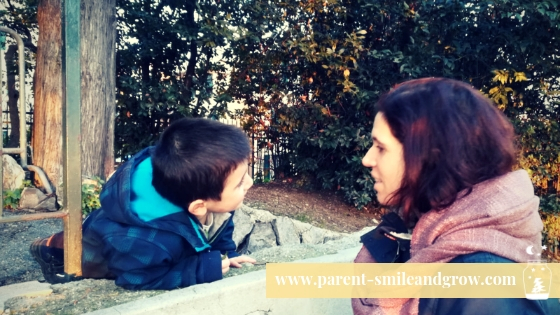
#1. Theory of mind is not innate
One surprising fact about our brain is that it is wonderfully plastic; we are born almost with a white sheet that develops according to the kind of experiences and relationships that we live.
If language learning is an aspect of the child’s cognitive development, learning to speak about oneself and others requires understanding our own alterity with respect to the rest of the world, and it is part of our social development. It takes time and experience.
This is called Theory of Mind; it indicates the ability to understand other people’s “mental states”, and to know how to use this ability to predict others’ behavior. Mental states include desires, perceptions, thoughts, beliefs.
What’s the point of knowing these things, you’re going to tell me? For example, to re-calibrate your expectations about what your child can understand and what he can’t. To better interpret her or his behaviors. The acquisition of abstract concepts, on oneself and on others, is in fact a gradual exercise.
Finally, understanding social development helps us to guide our child through his understanding and self-expression, respecting his stages of growth. Let’s see them together 😉
#2. The theory of the mind implies understanding oneself first
Don’t we say that before you can love others, you have to love yourself ? And in order to love oneself, you first need to.. know yourself !
Well, our brains develop just like that. As a baby, we started by abstracting ideas about ourselves.. In particular, about our desires 🙂
-
-
At 6 months, your baby begins to know how to identify her desires in her mind. She can’t openly verbalise them, but if you’ve ever dealt with a child that age, you’ll have seen she can make herself understand perfectly!
-
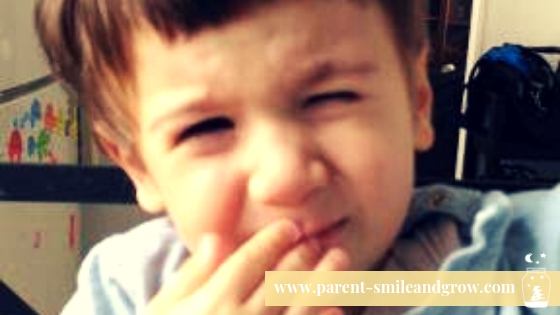
-
Between 15 and 24 months, the child begins to identify and express her internal states, her emotions. Especially if helped by adults (through books, guided interactions: “See, your brother is sad because you didn’t lend him the toy”).
-
At 18 months, you will see that your child begins to recognize herself in the mirror and talk about herself, her desires and perceptions (the sense of self). Try to draw a red dot on her nose with a marker, and put her in front of the mirror. If she touches her nose, it means that she can recognize herself, and this usually happens right around this age.
-
At about 30 months, she’s going to talk about her own thoughts, about what she believes.
In these stages, our help can really make a difference. According to Sue Gerhardt *, the child who learns to verbalize her experiences and emotions consistently, becomes an emotionally balanced adult; And this, regardless of the type of childhood (happy or not).
And then others! Social development and theory of mind
The theory of mind is a phase of the social development that relates to the interpretation of others’ mental states. It develops after the child has learned to abstract his own, following roughly the same order :
-
Other people’s desires at 36 months; where he understands that we can enjoy different things. (As demonstrated by the test on broccoli and crackers, of which I have told you here).
-
The emotions of others (empathy) between 3 and 4 years.
-
Finally, when around 4/5 year-old, children learn to abstract their own experiences from those of others. They understand that not only desires, but also ideas, beliefs and perceptions can differ from theirs.
Have you ever thought about how complex it actually is to get to abstract and distance our own minds to those of other people? Before reading about this theory and its experiments, I had not really grasped the difficulties of my second son compared to his sister for instance..
A lifelong learning I would say!
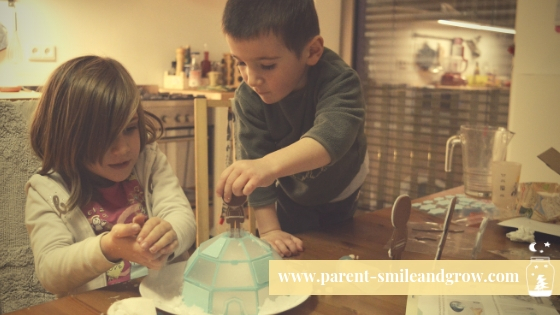
#3. From can you infer about your child’s social development stage? Through language
From a “scientific” point of view, the key element to verify a child’s stage in his social development, and thus about the formation of a theory of mind, is through language.
When children are about 3 years old, they start to contrast their tastes to those of others. My son for example tells me “I like pizza, while my sister only likes pasta.” or rather: “I always want to watch Peppa Pig, but my sister wants to watch the Winx, and I don’t like them!”
As their language, and understanding of the world, evolves, their words reflect their respective acquisitions.
Researchers in developmental psychology have used several experiments, which concern the understanding of each different mental state : the perception of different sensations, the different interpretation of one single action, etc.
There are some particularly fun experiments you can do, especially if your children are between 3 and 6 or 7. I am right in there so… I tested for you! 😉
#4. At some point in your child’s social development, you won’t see the same thing
Visual perception: What I see may not be the same thing you see.
If you’re dealing with children and you’ve seen them play hide and seek, you already know what I’m talking about.
Up to 4-5 years, children believe that what they see is what others see. And so, if their head is covered, then they are perfectly hidden. How did you find me?!
Come on, you’ll undoubtedly smile of tenderness while your little one puts his head only under the blanket, but still thinks he’s in a perfect hideout!
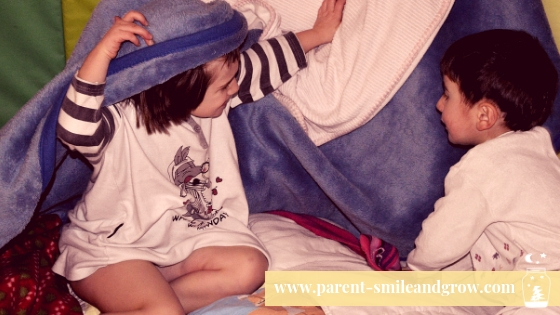
But if you want to try a more scientific test, here’s what the researchers did.
They have a child sit at one side of the table. In front of him, there’s a puppet. Right in the middle of the table there’s a mountain; and in front of the child, at the foot of the mountain, a little colored toy house.
Then they ask the child: “Do you think the puppet knows what color the house is?” What do you think he’ll answer?
If the child is in a social development’s stage where he has already acquired the theory of mind, he will say no. There’s a mountain in the middle! But otherwise, he will say “Sure! It’s pink! “
#5. At some point in your child’s social development, you won’t know the same things
Knowledge: I can know things that you don’t and vice versa.
What do I mean? Try this other experiment. It’s called “Appearance Reality Task”. Get a box designed to contain a specific object, such as a matchbox, biscuits, or patches, or markers; I mean, anything you usually use at home.
Empty it, and instead of the usual content, put something completely different.
Let’s pretend you get a rubber to erase and you stick it in a matchbox. Now go to your child, show him the box and ask him, “What’s inside this box?”
He will answer “Matches!”
Then ask him to open it to verify. “An eraser!” (or rubber, depending where you’re from).
The second question is this: “If we show this box to dad (or any other person who hasn’t witnessed to this exchange), what do you think he’ll say when you ask him what’s inside?”
What will your child answer? Test. Come on!
All right, I’ll tell you, then you’ll see if I guessed.
If your child is under 4/5, and has not yet acquired the theory of mind, he will tell you : “An eraser!”. You know what I know.
If, however, your child is older, he will answer: “Matches!”
Now try it if you don’t believe me!
#6.At some point in your child’s social development, you won’t believe the same things
Beliefs : We can have different beliefs, behaviors and expectations.
Among the stages of social development and understanding of others’ mental states, this is the most abstract, most difficult aspect of all in my opinion. As I said before, even as adults sometimes we struggle with that! But here’s the experiment.
Take two dolls, or two puppets, and give them a name if they don’t already have one. The researchers called the two characters Anne and Sally.
Look for a marble or other small and attractive game, and two objects where you can hide it, such as a basket, a box, etc.
Now you have to mimic a little story for your child. Anne and Sally are playing together. Anne finds a beautiful red marble, she takes it and puts it in her basket. Once she has secured her marble, she leaves the room and go play elsewhere.
What does Sally do then? She goes to get the marble from Anne’s basket, and puts it in her drawer.
But now Anne comes back in and looks for her beautiful marble! Where will Anne look first? That’s the question for your kids.
When I did this test for the first time to mine, my daughter was almost 5 years old and my son 2 and a half. I presented them the game at the same time, and asked them both.
It was impressive: I let answer my son first, who said : “In the drawer! I saw it, the marble is in the drawer! “
And immediately my daughter: “But no, she doesn’t know it’s in the drawer, she goes to look in her basket, that’s where she’d put it!”
“But the marble is in the drawer so Anne looks it in the drawer!”
Isn’t that unbelievable? Although my son has seen the same representation, he still fails to abstract the concept of a different observation of what happened.
His truth is still the only truth.
And note that this has nothing to do with developing empathy, in the specific case: My son is a very empathetic child for his age. Yet he still lacks the understanding of different points of view and beliefs.
#7. Developing theory of mind too soon has pros and cons
Now you know how it is possible for your firstborn to be able to get on his little brother or sister so well !
But besides the jokes. What the researchers have “measured” is that children who develop the theory of mind first, have more ease to make friends at school, are seen as “nicer” in the group – probably because they understand better than their peers how to interpret their gestures and behaviors.
If used poorly, however, this greater understanding can lead to sharper sensitivity, for example to the criticisms that are addressed to them, and/or bullying attitudes.
To an incorrect development of the theory of mind are instead associated with more serious problems such as autism or Asperger’s syndrome, although it is not yet entirely clear in detail.

Photo by Daniel Hjalmarsson
These tests are games for us, but they can actually serve as a signal to show the social development’s stage, and thus the level of understanding, of your child.
#8. Tell me if you have theory of mind, and I’ll understand you
Beyond the fun we can have together in doing these tests (because your little ones will adore the game and the questions, even if they don’t see the purpose or the meaning); what does your child’s social development tell you about him?
Let me give you a concrete example. My son is pretty precise. Maybe slightly more than the average.
What do I mean by that? That if he has to perform a task, such as getting dressed or washing hands, he’ll perform the individual steps in exactly the same order. He refuses to change it or accelerate it. If a slightest change intervenes, he rejects it..
Maybe even your child does the same.. And sometimes, when you’re trying to hurry in the morning and would like him to wash his hands faster and then spin to put on his shoes; or try to put him his socks on while he’s having breakfast, his refusal will irritate you.
But your child says NO and gets mad if you try to change his mind. You insist, he insists, you end up screaming, maybe you force him in the end.
Well.. At his age, he still fails to abstract certain concepts. So having clear in mind the structure of an action and the order in which each step must be executed, helps him to find his landmarks in space and time. It’s pointless to get angry at him.
Even the concept of time is very difficult to grasp. Even today, my firstborn refers to the passing of days in “sleeps”. How many sleeps are missing before Christmas? How many sleeps are missing until my birthday?
For my son, all that is tomorrow is indefinite future, without too many distinctions between one day or one month. The only way to make him understand, is by giving him a sequence of actions taking place in successive stages.
Understanding the stages of your child’s mental and social development means that it is we, the adults, who put in his shoes, and adapt our discourse and our expectations to treat him in a manner that’s respectful of his resources.
Otherwise, as it happened to myself several times.. When we fight this, we end up frustrated, while our child will be sad for not being understood, and perhaps feeling guilty. “How can you not understand that..?”
Try the game. You will have fun together and then you can give interesting answers!
Useful resources, cues and references
To write this article, I leaned on several sources. I’m listing them here, and adding some resources that I believe useful (links to Amazon are affiliate links).
-
* Sue Gerhardt, Why love matters, page 71
-
How parents can help their young children develop healthy social skills.
-
Video-Course Introduction to Development psychology, University of Queensland, Australia, on the Edx platform.
-
A few texts about Theory of Mind, its development, and its practical applications.
-
'The Whole brain child', by Daniel J. Siegel – Strategies to Nurture Your Child’s Developing Mind. (American psychiatrist, directs the Mindsight Institute in Los Angeles and has written several successful books dedicated to childhood).
Have you tried one of the experiments with your children? Tell me how it went in the comments’ section!
And if you liked the article but you haven’t subscribed to the newsletter yet.. You can fix this by clicking here! You will regularly receive inspiring content and ideas to grow together 🙂
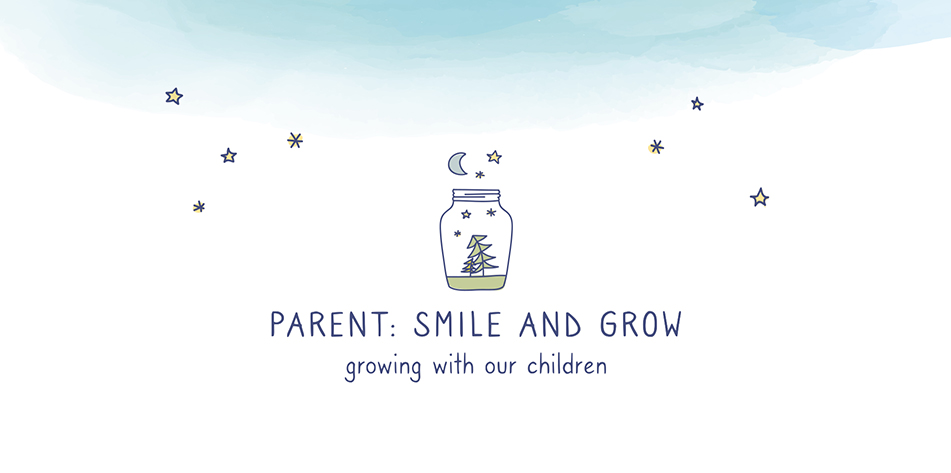
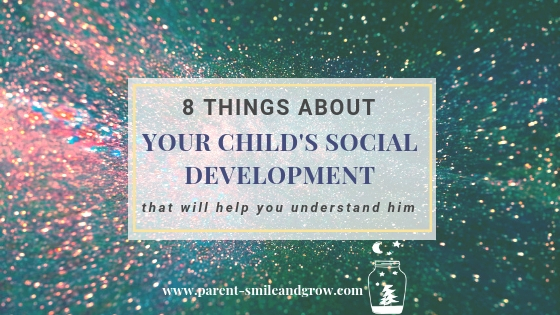
Yes
I love the words of this article. I think these will work. Thank you for sharing such important information with us.
You’re welcome! Glad it helps